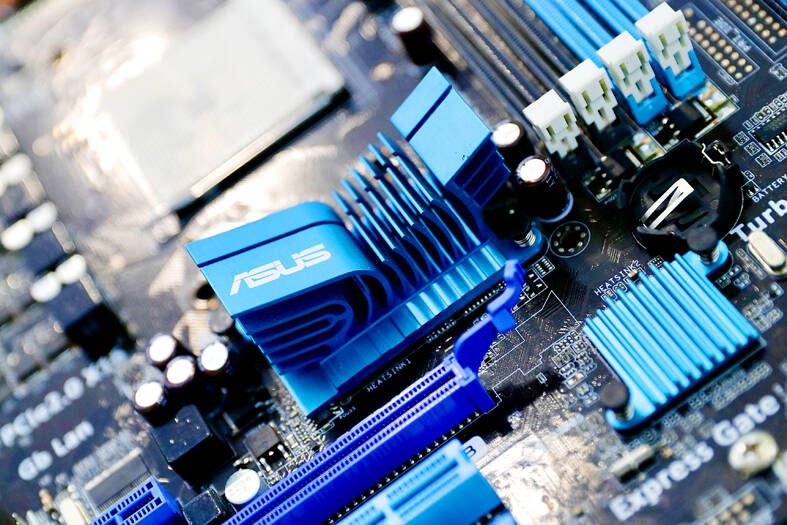The nation’s technology sector is heading toward a cyclical recovery in the second half of this year and into next year as export orders for electronic components rebound, DBS Bank Ltd said in a report on Tuesday.
Data released last week by the Ministry of Economic Affairs showed that export orders for electronic components, primarily semiconductors, last month shrank 0.4 percent year-on-year to US$17.7 billion.
While it marked the ninth consecutive month of annual declines, the drop at the start of the third quarter was notably less severe than the average 20.2 percent fall observed in the second quarter, indicating that external demand for Taiwan-made electronic components has begun to improve, DBS said.

Photo: Ritchie B. Tongo, EPA-EFE
The decline in demand from China, among the nation’s major export markets for electronic components, moderated as of last month and demand from ASEAN markets increased, while a deeper contraction continued for Japan and South Korea, it said.
Other factors that were conducive to the tech sector’s nascent recovery included a reduction of excess inventories, a stabilization in chip prices, a gradual pickup in demand for commercial PCs and smartphones, and increased investments in products used in artificial intelligence (AI) applications, it added.
Global PC shipments are forecast to grow 3.7 percent year-on-year to 261.4 million units next year, after an estimated decline of 13.7 percent to 252 million units this year, the International Data Corp (IDC) said in its Worldwide Quarterly PC Tracker report on Monday.
Meanwhile, worldwide smartphone shipments declined 6.8 percent annually to 268 million units in the second quarter of the year, the eighth consecutive quarter of contraction, IDC said in its Worldwide Quarterly Mobile Phone Tracker report on Aug. 11. While the market is still struggling with soft demand, inflation, macroeconomic uncertainties and excess inventory, the pace of decline last quarter was slowing compared to previous quarters, IDC said.
Moreover, semiconductors designed to execute AI workloads would present a revenue opportunity for the semiconductor sector this year, as the adoption of ChatGPT is spurring investments in generative AI, DBS said.
“Taiwan is poised to be an immediate major beneficiary of AI investments,” Singapore-based DBS economist Ma Tieying (馬鐵英) said in the report, referring to Taiwanese foundries led by Taiwan Semiconductor Manufacturing Co (TSMC, 台積電) as dominating about 90 percent of the global production of advanced logic chips under 10 nanometers.
With its leading-edge technology capacity and mature-node technologies, TSMC has already secured a substantial share of AI chip orders from Nvidia Corp and Advanced Micro Devices Inc, Ma said.
Meanwhile, Microsoft Corp, Alphabet Inc’s Google, Amazon.com Inc and Facebook owner Meta Platforms Inc are reportedly pursuing custom AI chip development, which would also leverage TSMC’s advanced nodes for fabrication, she said.
However, potential risks persist — including a global macroeconomic slowdown, escalating US-China tensions, continued monetary tightening in the West and an economic slump in China — which would exert pressure on global demand for end devices and weigh on Taiwan’s electronic component exports, the report said.
Moreover, if Washington is to implement more restrictive measures to limit China’s access to chips for AI, the move could generate additional negative effects on global semiconductor trade and potentially disrupt the expected tech recovery ahead, it added.
DBS maintains its GDP growth projections for Taiwan at 0.5 percent this year and 3.5 percent next year, the report said.

South Korea’s equity benchmark yesterday crossed a new milestone just a month after surpassing the once-unthinkable 5,000 mark as surging global memory demand powers the country’s biggest chipmakers. The KOSPI advanced as much as 2.6 percent to a record 6,123, with Samsung Electronics Co and SK Hynix Inc each gaining more than 2 percent. With the benchmark now up 45 percent this year, South Korea’s stock market capitalization has also moved past France’s, following last month’s overtaking of Germany’s. Long overlooked by foreign funds, despite being undervalued, South Korean stocks have now emerged as clear winners in the global market. The so-called “artificial intelligence

CONFUSION: Taiwan, Japan and other big exporters are cautiously monitoring the situation, while analysts said more Trump responses ate likely after his loss in court US trading partners in Asia started weighing fresh uncertainties yesterday after President Donald Trump vowed to impose a new tariff on imports, hours after the Supreme Court struck down many of the sweeping levies he used to launch a global trade war. The court’s ruling invalidated a number of tariffs that the Trump administration had imposed on Asian export powerhouses from China and South Korea to Japan and Taiwan, the world’s largest chip maker and a key player in tech supply chains. Within hours, Trump said he would impose a new 10 percent duty on US imports from all countries starting on

Chinese artificial intelligence (AI) start-up DeepSeek’s (深度求索) latest AI model, set to be released as soon as next week, was trained on Nvidia Corp’s most advanced AI chip, the Blackwell, a senior official of US President Donald Trump’s administration said on Monday, in what could represent a violation of US export controls. The US believes DeepSeek will remove the technical indicators that might reveal its use of American AI chips, the official said, adding that the Blackwells are likely clustered at its data center in Inner Mongolia, an autonomous region of China. The person declined to say how the US government received

Like many of us who are mindful of our plastic consumption, Beth Gardiner would take her own bags to the supermarket and be annoyed whenever she forgot to do so. Out without her refillable bottle, she would avoid buying bottled water. “Here I am, in my own little life, worrying about that and trying to use less plastic,” she says. Then she read an article in this newspaper, just over eight years ago, and discovered that fossil fuel companies had plowed more than US$180 billion into plastic plants in the US since 2010. “It was a kick in the teeth,” Gardiner